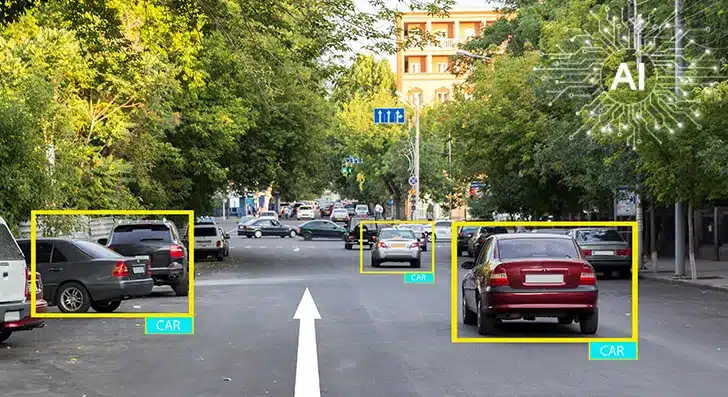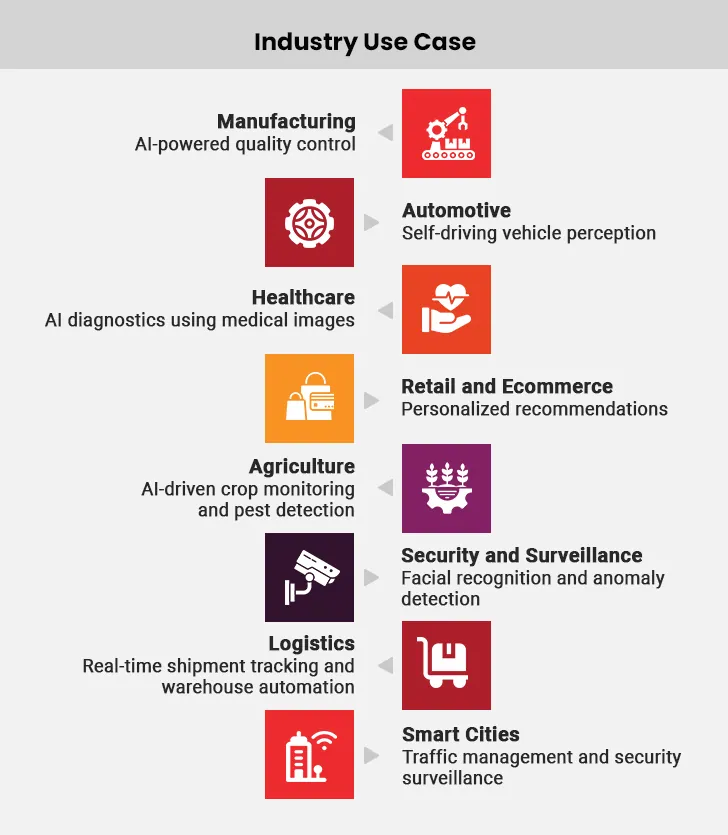Artificial intelligence (AI) and machine learning (ML) are no longer futuristic technologies, but an unbelievable reality. Take for example, unlocking phones without having to enter pins or passwords manually. Another instance when you say, “Setan alarm of 06:00 AM tomorrow,” and it is done. From agriculture to manufacturing and a wide range of industries in between, AI/ML-based models have revolutionized businesses of multiple sizes and types.
But AI doesn’t work on its own—it learns from data. Annotated data is the horsepower that fuels these amazing feats of technology. It acts as the foundation, helping AI recognize patterns, make decisions, and improve over time. AI data annotation services ensure AI models are trained with accuracy, making them smarter and more reliable.

Table of Contents
The Critical Role of Data Annotation in Training AI and Machine Learning Models
Significance of Data Annotation in Machine Learning
- Object Detection and Image Recognition
- Sentiment Analysis
- Natural Language Processing (NLP)
- Speech Recognition
Automation vs. Human Oversight in Data Annotation
Types of AI Data Annotation for Industrial Use
- Manufacturing
- Automotive
- Healthcare
- Retail and Ecommerce
- Agriculture
- Security and Surveillance
- Supply Chain and Logistics
- Smart Cities
Investing in Expertise: Advantages of Outsourcing Data Annotation
Significance of Data Annotation in Machine Learning
In the age of data deluge, annotations provide meaning and context for machines to comprehend their environment and perform the desired actions. Data annotation for machine learning is the fuel that powers the ML engines. With every annotation, the AI model learns, refines its understanding, and ultimately unlocks its potential.
The global AI software market is expanding rapidly. Forecasts estimate it will reach $391.43 billion by 2030, growing at a CAGR of 30% between 2023 and 2030. This rapid growth highlights the increasing reliance on AI-driven applications, all requiring high-quality annotated data for training.
With AI adoption surging, demand for data centers is also skyrocketing. McKinsey’s analysis suggests that global demand for data center capacity could rise at an annual rate of 19-22% from 2023 to 2030, reaching an annual demand of 171-219 gigawatts. This rapid expansion underscores AI’s growing role across industries.
Much like the demand for AI technologies, its applications have also diversified and so has the volume of data involved. The goal now is to connect these dots.
Consider, for instance, a self-driving car company that plans to develop its autonomous driving software. As obvious, the company has mountains of sensor data, including Lidar, camera footage, radar readings, etc. However, the autonomous vehicle doesn’t yet understand what’s in its environment. Data annotation services, therefore, build the link between raw data and powerful AI models—objects on the road such as pedestrians, cyclists, vehicles, traffic lights, road signs, etc., are meticulously labeled. This annotated data empowers the self-driving car (AI models in general) to identify objects in real-time, make driving decisions, and navigate safely.
Take another case in point: a healthcare institution developing an AI/ML system to analyze medical scans for early signs of cancer. The raw data here is a collection of X-rays, mammograms, CT scans, MRIs, and other medical images. Without annotated data, the AI model would be blind to the subtle differences between a healthy tissue and a cancerous tumor.
Data annotation companies act as cartographers of this medical data. The professionals meticulously label each image, outlining tumors, identifying specific features, and classifying them based on their severity. This annotated data becomes the training ground for the AI/ML model, teaching it to recognize patterns, differentiate between healthy and cancerous tissues, and ultimately make accurate diagnoses. Here’s how data annotation plays a crucial role in machine learning and training:
1. Object Detection and Image Recognition
Object detection and image recognition are fundamental tasks in computer vision models, enabling machine learning algorithms to locate objects within an image or video—whether these are faces in photos or tumors in medical scans. This power features like biometric identification in the form of facial recognition, iris scanners, and fingerprint scanners in smartphones, self-driving car obstacle detection, and automated medical diagnosis systems.
2. Sentiment Analysis
Wondering how chatbots give human-like responses? Annotating text data with sentiment labels such as positive, negative, and neutral enables the AI/ML models to understand the emotional tone of language. This fuels applications like social media sentiment analysis, spam filtering, content moderation, and chatbots that can respond with appropriate emotions. Market research, customer service, and social media are some of the areas where sentiment analysis is often applied.
3. Natural Language Processing (NLP)
Labeling text data with categories, entities, and relationships enables algorithms to understand the meaning and context of language. Data annotation outsourcing companies break down the nuances of language, powering applications like machine translation, chatbots that can engage in conversations, and even automated document summarization.
4. Speech Recognition
Labeling spoken words trains virtual assistants like Alexa, voice search engines like Google, and transcription software to accurately convert audio into text. This way, machines can easily process and understand audio information. In virtual assistants, for instance, annotated data helps improve the accuracy of voice recognition and natural language understanding, enhancing the overall user experience.
Automation vs. Human Oversight in Data Annotation
Striking the right balance between automation and human oversight is crucial in data annotation. AI-powered tools can efficiently label large datasets at scale. Still, human reviewers play a vital role in ensuring accuracy, particularly for complex tasks like interpreting sentiment nuances or identifying objects in low-visibility images.
Techniques such as semi-supervised learning and active learning enhance the annotation process by allowing AI to pre-label data, which is further validated and refined by human annotators. This approach minimizes manual effort while maintaining high-quality annotations.
Building Smarter AI: The Critical Role of Human-Centric Data Annotation
Types of AI Data Annotation for Industrial Use
- Object Detection and Tracking: Applying 2D bounding boxes to identify objects in images or video, assisting in the determination of their size, position, and trajectory. In 3D contexts, cuboids are often employed for accurate spatial identification.
- Instance Segmentation: Utilizing polygonal annotation to draw accurate borders of objects, paying attention to detecting the precise boundary and defining shape.
- Semantic Segmentation: Applying a class label to every pixel in an image so that AI models can group and distinguish more than one object within a target environment.
Use Cases of Artificial Intelligence Data Annotation Across Industries

I) Manufacturing
AI-powered data annotation improves quality control through the precise detection of product defects. By inspecting annotated images, automated inspection equipment is able to detect anomalies, so that only perfect products hit the shelves. Object tracking within factories also facilitates the optimization of assembly line efficiency and the reduction of operational downtime.
II) Automotive
Self-driving cars depend on annotated datasets to detect objects, lane markings, and pedestrians. Bounding boxes and semantic segmentation enable AI systems to comprehend road scenes, making navigation and safety better. Traffic monitoring systems even use labeled video streams to scrutinize congestion trends and improve mobility in cities.
III) Healthcare
AI diagnostics rely on annotated medical scans, including X-rays, MRIs, and CT scans, to identify diseases early. Labeled datasets train machine learning models to identify anomalies, aid doctors in decision-making, and enhance treatment accuracy. Medical AI also accelerates workflows, lessening the workload on healthcare professionals.
Building An Ethical AI in Healthcare: The Critical Role of Data Annotation Services
IV) Retail and Ecommerce
AI applies data annotation for product identification, inventory management, and customized suggestions. Annotated images assist AI models in comprehending product categories, leading to precise search results and improved customer experiences. AI-powered checkout systems also employ labeled datasets to identify items and bill automatically.
V) Agriculture
AI interprets labeled drone and satellite images to track crop health, identify pests, and measure soil conditions. By leveraging labeled farm data, farmers make informed decisions, maximize yield, and minimize the use of pesticides. AI is also useful for monitoring livestock, as labeled images assist in tracking animal well-being and movements.
VI) Security and Surveillance
Facial recognition and anomaly detection solutions depend on well-labeled datasets to provide better security. AI models trained on labeled video feeds detect suspicious behavior, alert against unauthorized access, and avert security intrusions. Intelligent surveillance solutions enhance public space safety, workplace security, and residential security.
VII) Supply Chain and Logistics
Object tracking powered by AI, with the help of annotated data, enhances logistics by tracking shipments in real-time. Automated warehouse systems use labeled data to track inventory effectively, minimizing errors and delays. AI also optimizes route planning for quicker and cheaper deliveries.
VIII) Smart Cities
Annotated video streams are essential for traffic management, infrastructure monitoring, and public safety. Artificial intelligence-based systems scan road conditions, identify accidents, and maximize traffic signals. Smart city solutions, fueled by labeled datasets, improve urban planning, enhance emergency response, and build safer, more efficient cities.
Investing in Expertise: Advantages of Outsourcing Data Annotation
As a vital tool, businesses leverage data annotation to power the engine of their AI and ML models. However, accurately labeling vast quantities of data to get reliable outcomes is an uphill task. Even minor errors in the annotation process impede the efforts, putting the AI/ML model into flames. The global data annotation tool market was valued at $3.9 billion in 2024 and is expected to reach $15.2 billion by 2032, growing at a CAGR of 6.5% from 2024 to 2032. This growth reflects the increasing reliance on data annotation services across industries. Professional expertise is required to ensure precision in the outcomes. Thus, companies that outsource AI data annotation services gain the following benefits:
1. Assured Reliability and Precision in Outcomes
Accuracy is paramount in the data annotation process. Addressing this concern, outsourcing companies usually leverage Artificial Intelligence data annotation tools to prepare training datasets. Backed by dedicated AI annotation teams possessing subject matter expertise and rigorous quality control practices, they deliver highly accurate data, boosting the performance and reliability of your AI models.
2. Accelerated Model Training Process
Large-scale projects require massive amounts of labeled data. Managing the data spikes in-house along with core business competencies becomes challenging. In contrast, organizations that outsource data annotation free up their resources to focus on model development, while ensuring a steady flow of training data.
3. Flexibility and Scalability
As the project scales and the AI/ML model evolves, the need for annotated datasets also grows. This poses a significant challenge for many companies, especially the ones with limited resources. Outsourcing, thus, allows businesses to adjust their annotation needs based on project requirements, minimizing costs and maximizing efficiency.
4. Technological Competence
One of the tangible advantages of collaborating with third-party service providers is that they leverage AI data annotation tools and platforms to streamline workflows, enhance security, and ensure quality. Rather than investing in tools and platforms, businesses gain technological advantage and get precisely labeled training datasets within the stipulated time and budget.
5. Access to Diversely Skilled Annotators
Data annotation is a complicated process, which requires specialized expertise, especially in domains like healthcare. Outsourcing companies have access to a global pool of annotators with expertise in various languages, domains, and data types, meeting your specific project requirements. Knowing the best practices for ethics and standards, these experts avoid biases and deliver reliable results.
Bottom Line
Whether it’s self-driving cars navigating safely through the busy streets or chatbots offering personalized customer service, data annotation is the invisible force behind the scenes, making AI a reality. By bridging the gap between raw data and machine learning models, AI annotation fuels the advancements that are creatively disrupting industries and reshaping the future of businesses across the world. Thus, it is apt to sum up that data annotation services serve as the very essence that empowers businesses to unlock the power of AI. By ensuring that the models are trained on accurate and precise data, companies pave the way for innovation, efficiency, and success.





